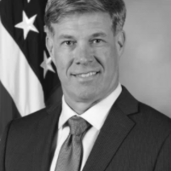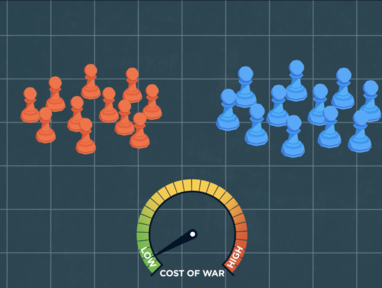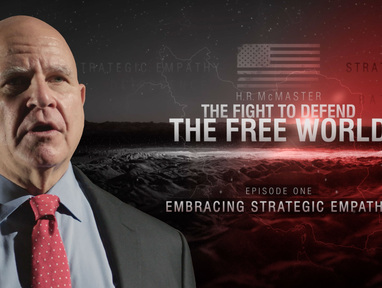Keeping Our Nation Secure

The nature of war remains constant, even while technology and people continue to change. How should the United States prepare in order to safeguard its national security?
How has thinking about national security changed?
In order to understand why national security is important, we must first understand the challenges that we face as a nation. Since the attacks of September 11, 2001, there has been a rise of new security threats never imagined decades ago. Cyberattacks, the disruptive capability of China and Russia, and the increase of populism and nativism both at home and abroad have shaken the liberal international order international system.
In the video below, Condoleezza Rice discusses how policy makers are responding to these challenges.
When it comes to solving these problems, war is never the first option. And yet countries around the world have engaged in war for as long as we can remember. Countries don’t declare war over petty arguments or personal grudges. Eighteenth-century military theorist Carl von Clausewitz posited that “war is the continuation of politics by other means.” In other words, when political leaders have exhausted peaceful methods, they begin to consider the cost of getting what they want through military force. The video below explains this in further detail:
If America is to avoid war, it must accept the realities of its situation. In a Foreign Affairs article, Hoover fellows Kori Schake, Jim Mattis, Jim Ellis, and Joe Felter write:
The world is not getting safer, for the United States or for U.S. interests. Even before the coronavirus pandemic, the 2017 National Defense Strategy described an international environment of increased global disorder, long-term strategic competition, rapid dispersion of technologies, and eroding U.S. military advantages. Protecting the United States requires a strategy of defense in depth—that is, of identifying and dealing with global problems where they occur rather than waiting for threats to reach American shores.
So what is America’s national security strategy, and will it be sufficient to protect our national interests?
Does America have a coherent national security strategy?
For the past two decades, the United States has been unguided in its approach to national security. In failing to follow a coherent security strategy, the US has been reactive to crises rather than taking proactive actions to prevent them. The following video elaborates on the shortcomings of US national security and offers perspective on how to fix it.
As we learned in the video above, the key to effectively managing our national security will be a clearly defined, well communicated, and adequately supported strategy. A strategy is more than just a plan. A strategy has a clear purpose and includes the methods used to accomplish a goal.
In the video below, H. R. McMaster explains why it is important to be precise in our use of the word strategy, and what that means for American national security.
Our strategic narcissism—the tendency to define problems as we would like them to be and only in relation to ourselves—leads to a blind spot in our national security. In the video below, McMaster advises on how we might overcome strategic narcissism.
How can we avoid strategic mistakes in our foreign policy?
In order to secure a better and freer world, American leaders must abandon the assumption that other countries have no aspirations or agency except in reaction to American policy. This will require strategic empathy—developing an understanding that ideology, emotions, and aspirations drive and constrain the actions of other countries. In the following video, McMaster explains why it is important to embrace strategic empathy.
When we embrace strategic empathy, we gain a clearer understanding that national security is not something America can achieve alone. Ever present adversaries require the United States to make and maintain strong allies abroad. In their Foreign Affairs article, Schake, Mattis, Ellis, and Felter write:
Not even the United States is strong enough to protect itself on its own. Fundamentally, it needs help to preserve its way of life. Cooperating with like-minded nations to sustain an international order of mutual security and prosperity is a cost-effective way of securing that help. But doing so means resisting the temptation to maximize U.S. gains at the expense of countries that share its objectives and instead utilizing the powers of influence and inspiration to enlarge the group of countries that work with the United States to a common purpose.
Forming alliances means building trust– both with our allies and with our adversaries. As the late George Shultz often said, trust is the coin of the realm. We must be willing to follow through on our word; otherwise, we lose our influence, authority, and integrity. Shultz discusses this “boot camp wisdom” below.
A robust national security strategy is deeply important to sustaining our way of life and promoting global peace, but many still believe that our own national security would be better served if America pursued an isolationist foreign policy. Why should America remain engaged abroad? McMaster answers below.
Conclusion
In this edition of Policy Insights, we discussed the flaws of America’s national security strategy, as well as some ways it may be improved. In the next edition, we’ll take a closer look at America’s responses to growing global powers and what policy makers can do to help support democracy and the rule of law abroad.












